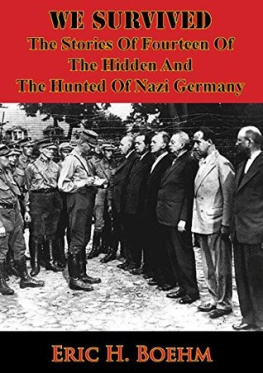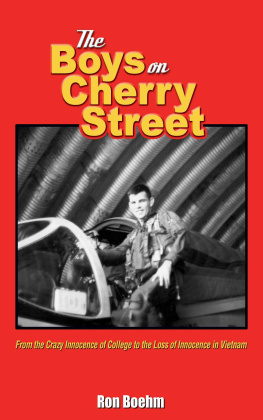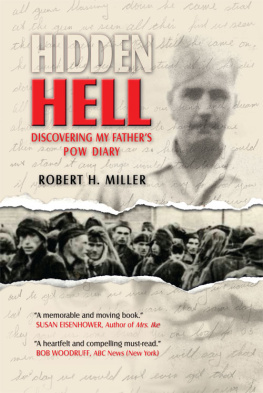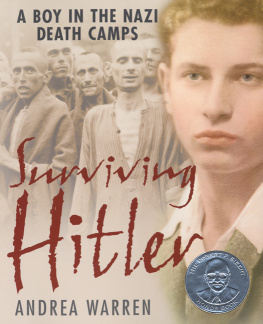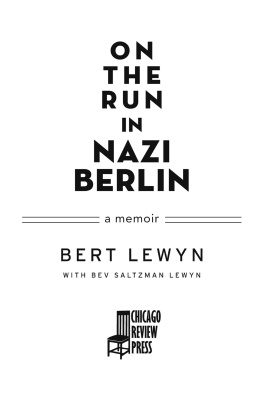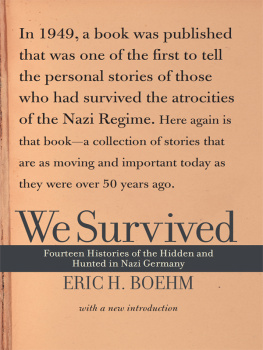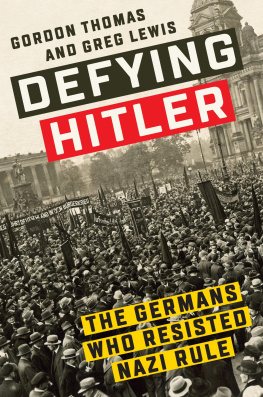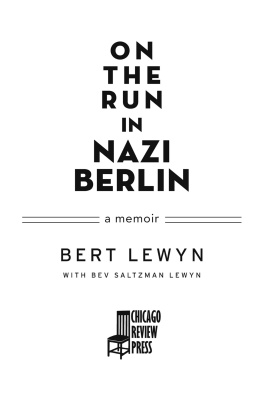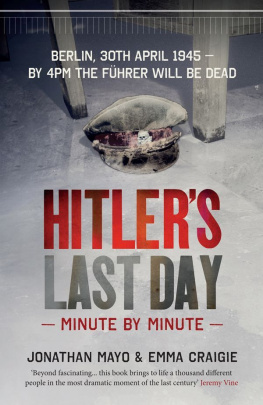We Survived
We Survived
Fourteen Histories of the Hidden and Hunted in Nazi Germany
Revised and Updated
ERIC H. BOEHM

A Member of the Perseus Books Group
All rights reserved. Printed in the United States of America. No part of this publication may be reproduced or transmitted in any form or by any means, electronic or mechanical, including photocopy, recording, or any information storage and retrieval system, without permission in writing from the publisher.
Copyright 1985 by Eric H. Boehm, updated 2003
Westview Press books are available at special discounts for bulk purchases in the United States by corporations, institutions, and other organizations. For more information, please contact the Special Markets Department at the Perseus Books Group, 11 Cambridge Center, Cambridge MA 02142, or call (617) 252-5298 or (800) 255-1514 or email .
Published in 2003 in the United States of America by Westview Press, 5500 Central Avenue, Boulder, Colorado 80301-2877 and in the United Kingdom by Westview Press, 12 Hids Copse Road, Cumnor Hill, Oxford OX2 9JJ.
Hardcover edition published by Yale University Press, 1949; reprint edition, 1966 by Clio Press.
Material for Epilogue 1985 adapted with permission from Comment: Prevention of Genocide, by Eric H. Boehm, in Western Society after the Holocaust , edited by Lyman H. Legters (Westview Press, 1983).
Find us on the World Wide Web at www.westviewpress.com
A Cataloging-in-Publication data record for this book is available from the Library of Congress.
ISBN 10: 0-8133-4058-6 ISBN 13: 978-0-8133-4058-6 (pbk.)
eBook ISBN: 9780786730551
Dedicated
to the
Survivors
In Memory of
the Countless Dead
Introduction: In Retrospect
The Historical Setting of We Survived
J UST AS HUMAN EVIL IS REVEALED IN THIS BOOK, SO is the human potential for good and the possibility of attendant salvation. Viktor Frankl, himself a survivor of Auschwitz, addresses the issues of good and evil in humankind and the attendant therapy he espouses in his famous book Mans Search for Meaning . He emphasizes in this searching book: The rift dividing good from evil, which goes through all human beings, reaches into the lowest depths and becomes apparent even on the bottom of the abyss which is laid open by the concentration camp (p. 87). The great Italian literary figure, Primo Levi, became one of the most sensitive observers in the Auschwitz extermination camp. He made this insightful observation: Survival without renunciation of any part of ones moral worldsapart from powerful and direct interventions by fortunewas conceded only to a very few superior individuals, made of the stuff of martyrs and saints. The literature on survival and genocide has grown exponentially in the past decadesitself part of the huge evidence of our search for a meaningful interprtation of who we humans are and what we are capable of becomingand seeing us always groping for answers.
In 2002, as these lines go to the publisher, we are again living in times of threats of wars. The relevance of the chapters in this book to issues of survival that confront us today is more acute than ever during this new era of weapons of mass destruction that were first developed in World War II. The chapters in this book hold up to us a mirror of humanityat its worst and its best: evidence of both the horrible and the good of humanity runs through the pages of this book.
A longer historical perspective we try to convey below, with the help of the distinguished historian Arthur Schlesinger Jr.s insightful article, provides reason for hope. Long-term survival is a function of good government, both on the national and world arenas. The United Nations Organization may not be all we wish it to be, but contrasted with the weakness of its predecessor, the League of Nations, the United Nations is a beacon of significance and strength. The issues that engaged our minds and hearts during the darkest and most threatening of times of the twentieth century led many contemporaries to believe in a wave of the future of totalitarian statesthat in fact capitalized on acute human needs to treat human beings as pawns. In his overview of the twentieth century Arthur Schlesinger Jr. conveys that faith was justified in the coming victory of democracy (as we expressed our optimism in the darkest days of the twentieth century) and hence of governments that nurture the lives of their citizens. Here is his article on the twentieth century, both replete with realism and hope: Totalitarianism collapsed before the superior power, energy and vitality of free societies.
Witness to the Century: The Glorious and the Damned Arthur Schlesinger Jr.
Its coming to an end at last, this disordered, disheveled, fantastic, path-breaking century, this crazy epoch of troubles and tragedies and triumphs. Our century has been glorious, and it has been damned. It has sent humanity through unprecedented horrors on the way to the stars. It has been, in the words of the English philosopher Isaiah Berlin, the most terrible [century] in Western history. The world wars carried destruction to the far corners of the planet. The chronicles of human wreckagethe Holocaust and the gulaghaunt us still. At the same time, ours has been the century in which science and technology have opened dazzling new prospects for suffering humankind.
What will the future make of the 20th century? Five hundred years from now, our century will probably be remembered most of all as the century in which earthlings at last burst their terrestrial bonds and began the exploration of space. My generation was reared on the visionary imagination of Jules Verne and H.G. Wells. But space travel always seemed a romantic dream. I never thought that men would actually land on the moon in my lifetime. Yet it happened in 1969. To me it was the most exciting event in the century. The aftermath has been rather dilatory, almost as if Columbus had come to America in 1492 and no one had bothered to follow up. But the century ahead will surely see startling new developments in the grand adventure of space.
From the perspective of 2500, our century will also be remembered as the century that opened the Pandoras box of nuclear weapons. Henry Adams, the most brilliant of American historians, had earlier foreseen the possibility of ultimate catastrophe. I firmly believe that before many centuries more, science will be the master of man, Adams wrote in 1862 while the Monitor and the Merrimack, two new ironclad vessels, were harrying each other around Newport News, VA. Some day science shall have the existence of mankind in its power, and the human race will commit suicide by blowing up the world.
Precisely a century later, that day almost arrived. The Cuban missile crisis of 1962 was probably the most dangerous moment in human history. Never before did nations locked in mortal rivalry possess the technical capacity to destroy the Earth. Fortunately wise statesmanship averted disaster, and the superpowers never called forth their dread arsenals. Yet the threat continues into the century ahead. No problem is more urgent at the millennium than the need to stop the testing and proliferation of nuclear weapons.
The Cold War cast grim shadows over the Earth for nearly half our century. But men and women in centuries to come will very likely find the confrontation between the Soviet Union and the West almost as obscure and incomprehensible as we today find the Thirty Years Warthe terrible conflict that devastated so much of Europe in the first half of the 17th century. Looking back at the 20th century, our descendants will probably be astonished at the disproportion between the causes of the global civil war, which may seem trivial, and the possible consequences, which might have meant the veritable end of history.
Next page
